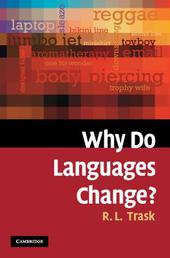
|
Why Do Languages Change?
Hardback
Main Details
| Title |
Why Do Languages Change?
|
| Authors and Contributors |
By (author) Larry Trask
|
| Physical Properties |
| Format:Hardback | | Pages:210 | | Dimensions(mm): Height 234,Width 156 |
|
| Category/Genre | Historical and comparative linguistics |
|---|
| ISBN/Barcode |
9780521838023
|
| Classifications | Dewey:410.9 |
|---|
| Audience | | Tertiary Education (US: College) | | General | |
|---|
| Illustrations |
11 Tables, unspecified; 8 Line drawings, unspecified
|
|
Publishing Details |
| Publisher |
Cambridge University Press
|
| Imprint |
Cambridge University Press
|
| Publication Date |
24 December 2009 |
| Publication Country |
United Kingdom
|
Description
The first recorded English name for the make-up we now call blusher was paint, in 1660. In the 1700s a new word, rouge, displaced paint, and remained in standard usage for around two centuries. Then, in 1965, an advertisement coined a new word for the product: blusher. Each generation speaks a little differently, and every language is constantly changing. It is not only words that change, every aspect of a language changes over time - pronunciation, word-meanings and grammar. Packed with fascinating examples of changes in the English language over time, this entertaining book explores the origin of words and place names, the differences between British and American English, and the apparent eccentricities of the English spelling system. Amusingly written yet deeply instructive, it will be enjoyed by anyone involved in studying the English language and its history, as well as anyone interested in how and why languages change.
Author Biography
R. L. Trask was a world authority on the Basque language and on historical linguistics. He wrote both academic and popular books, notably on grammar, punctuation, and English style and usage. His publications include Language: The Basics (1995) and Mind the Gaffe (2001). At the time of his death in 2004, he was Professor of Linguistics at the University of Sussex.
Reviews'Clear, sensible and stimulating ... a fine memorial to the late Larry Trask. This book deserves to succeed as a splendid introductory text for anyone interested in language change.' Jeremy J. Smith, University of Glasgow 'Trask's enthusiasm and learning are obvious ... will give its readers more enjoyment than many other volumes on the subject ...' The Times Literary Supplement
|